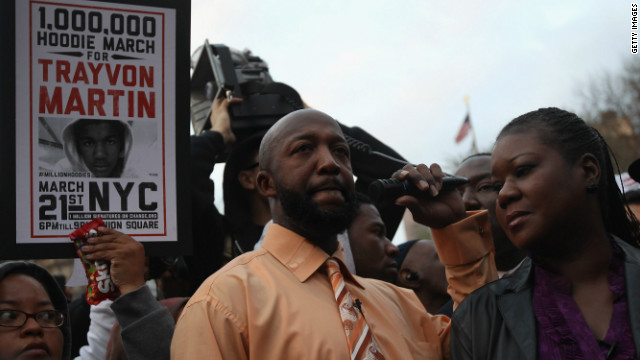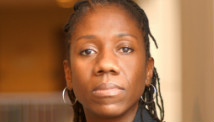updated 7:33 PM EDT, Thu March 22, 2012

Tracy Martin and Sybrina Fulton address supporters at the Million Hoodies March on Wednesday in New York.
Editor's note:
Sherrilyn A. Ifill is a professor at the University of Maryland School
of Law and the chairwoman of the U.S. Programs Board of the Open Society Foundations. She is the author of "On the Courthouse Lawn: Confronting the Legacy of Lynching in the Twenty-first Century."
(CNN) -- The hardest part of listening to Trayvon
Martin's mother speak about her son's death is hearing the tone of her
voice. It bears a heaviness that speaks not just of grief but of
resignation.
Sybrina Fulton is living
the nightmare that every black mother carries in the back of her mind
every day. Her son has been senselessly killed by someone who didn't see
her son -- a normal American teenager -- but saw just a black boy and
felt threatened. The police know the killer but have not arrested him.
All of the known facts
support the likelihood that Martin was pursued and killed by a zealous
neighborhood watch captain. But Martin is black, his assailant, George
Zimmerman, is white (Hispanic), and the events took place in Florida,
which has a strong self-defense law. So rather than quietly grieve,
comforted by the assurance that this terrible wrong will be forcefully
addressed, Fulton must do what many black mothers have had to do for
centuries. She must lead the charge to bring the killer to justice. She
must hire a lawyer, although her son broke no law. She must appear at
rallies and on the radio to keep public pressure on local police who
have refused to arrest Zimmerman.

Sherrilyn A. Ifill
In the early 20th
century, the consequences for the kind of relentless determination
displayed by Fulton could be deadly. Of the several dozen black women
who were lynched in our nation's history, most were killed in
retaliation for demanding the arrest of those who murdered their sons or
husbands.
We've come a long way
since those days. But Fulton still feels the pain of having to defend
the honor of her son and justify the significance of his life.
She does not say this.
But in her voice we hear the sound of a burden centuries old and almost
too heavy to bear. In a way, she is walking the rugged path forged so
courageously and publicly by Mamie Mae Till more than 50 years ago, who
never rested in her search for justice for her slain son, Emmitt.
The fear of Fulton's
terrible journey is what motivates so many black mothers to harangue
their sons with demands that they call home when they're out, that they
take a friend with them and that they watch their backs. We imagine what
could happen and try to do our best to keep the nightmare at bay. Our
hearts break when we hear the recount of Martin's call to a friend in
the minutes before he was killed. He knew Zimmerman was following him.
His fear was mixed with a young man's pride: "I'm not gonna run."
Yes, we know about those
parents who don't parent, who let their children run wild without
supervision. But we also know the truth. And the truth is that most
black mothers parent with determination, authority and fear. Especially
those mothers who have sons.
The teenage rites of
passage that thrill our white counterpoints send fear down a black
mother's spine. When your child is old enough to walk to a friend's
house in the neighborhood, it can mean the first of many stop-and-frisk
encounters with the police. When they turn 18, they can now be arrested
and charged as an adult for being in the wrong place at the wrong time. A
new driver's license and car opens the door to driving-while-black
stops. Just having a flat tire in the road can end with a senseless
murder, like the death of Camille and Bill Cosby's son Ennis on the Los
Angeles freeway in 1997.
Without question, white
mothers lose their sons to murder too, and black mothers who lose their
sons and daughters to murder do so more often at the hands of other
black men or boys. There is no comfort for any of these mothers; there
is just the hope of justice. But when a white neighborhood watch captain
with a record of run-ins with the law follows, shoots and kills a black
unarmed teenager and no arrest is made, even the cold comfort of
justice is denied.
There are too many
weeping, grieving mothers in our gun-soaked, violent nation. All that
Sybrina Fulton asks for are answers and justice. Every mother of every
race should stand with her.
No comments:
Post a Comment